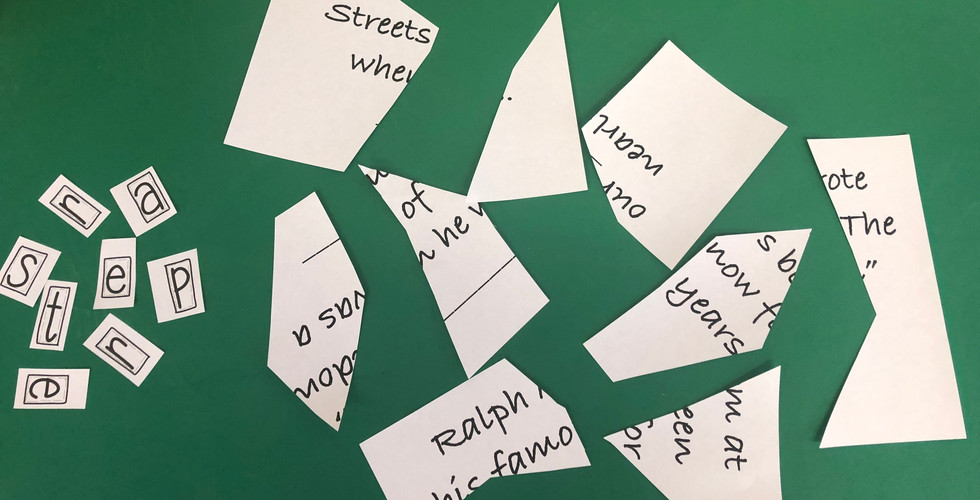Summer school lessons: from a handout to an awesome activity 😆
- Ewa Górna
- Jul 14, 2018
- 5 min read
Updated: Jul 2, 2019
It's been quite a long time since I wrote anything. I had a really hectic end of the school year and the amount of work that needed to be done stopped me from writing. But now school is over and I can relax and .... oh no .... wait .... I can't because, in a true workaholic fashion, I spend my summers working on a summer camp in England 😅
The camp I work for is not your typical summer school. Not all the campers have English lessons. It's an optional extra which some kids get to do if their parents paid for it. Now, as you can probably imagine this is not the most advantegous set up for the teachers. We have to compete, so to speak, with all the other activities available on camp. That is because when some of the kids are having lessons, their friends go off quad biking or swimming. You ask yourself this question: what sounds better to the 10-year-old you, lessons or quad biking? See what I mean? 😉 All of the above mean that my lessons need to be as attractive, fun, interactive, and basically awesome as humanly possible. So in this post I'll show you how I do it.
I like saying that you don't have to reinvent the wheel when planning your lessons. There are so many books and materials available online to use. You just have to spend some time thinking about how to jazz them up 😁
For the lessons I'm going to show you I used "Instant Lessons Intermediate" and "Instant Lessons Advanced" by Penguin Publishing (series editor: Peter Watcyn-Jones). I've used two chapters dealing with vocabulary: "Types of people" and "Idioms to describe people". On top of a nice description of the whole lesson and various activities, this is what the books have to offer:
Don't get me wrong: those are great books, and materials and exercises in them are really useful. But they would not work on a summer camp. They're meant for a lesson where students sit in a classroom. I need something more.
So this is what I did with it:

EXERCISE 1:
I cut up the words with definitions into separate strips. I gave each student two or three words and told them that they have 3 minutes to try and remember their words. After 3 minutes I went around the classroom with scissors and cut off the definitions. Now their task was to come up to every other student in the classroom and to me and say what their words mean.
EXERCISE 2:
I used the same handout to cut off the words. I folded them in half. This time, one by one, students had to pick one and give its definition. If they didn't remember, I asked someone else to help. We went through all the words again.
EXERCISE 3:
I made my own handout with all the words and definitions. This time every single word was cut up into three pieces. Students were put into groups. Their task was to recreate all the words and match them with their definition. I gave them an A3 sheet of paper to glue everything onto it. They did it as a race. The first team to finish got lollypops (it is a summer camp after all, you need to find additional motivation to complete exercises 😝)

EXERCISE 4:
My favourite! It happened in the next lesson. The book offered an exercise in which the teacher reads out a sentence with one word missing in it and the students have to say what words it was. I've prepared a set of 10 envelopes for each group of students. In each envelope there was a sentence on an A4 sheet of paper cut up into pieces. In the same envelope I've put the missing word, but cut up into letters. I gave the envelopes to other people working on camp who were nice enough to help me run this activity. Now, to get the envelope kids had to run to another part of the camp. There they were given a definition of a word and they had to say what word it was. If the word was correct they were given their first envelope; if they didn't remember the word they had to run back to the classroom, check the word on the material they made in exercise 3, and run back to get their envelope. Once they had their envelope, back in the classroom, they had to put the sentence together and arrange the letters of the missing word correctly. If it was correct I gave them green light to run to get the next envelope. Winners would get a small packet of Maltesers each. They got soooooo into it !!! They revised all of the vocabulary from the previous lesson. They learnt 20 new vocabulary items, 10 of them they had to 'exchange' for the envelope, the other 10 were the words missing from sentences.
EXERCISE 5:
Moving on to idioms. If you looked closely at the page from the book, you've probably noticed that most of the words from the chapter were compounds, e.g. chatterbox, skinflint, etc. I've prepared an activity in which every student was given all the words in two parts, e.g. a skin - flint. They had to match the two halves to make the words. They didn't know these words, it was a guessing game to familiarise them with the material they will be dealing with. After 5 minutes I told them that now they will be given a chance to check all the words. I stuck them to the backside of small foam mats and scattered the mats all over the hallway. Some mats had nothing stuck onto them. I told them that they have to run, flip over the mat, try and remember the word, come back to the classroom and arrange it from the cut up pieces. Again, there were sweets ready for the winner.

EXERCISE 6:
Once they knew all the words it was time to find out what their meaning is. We did this in a form of a betting game 😁 I was displaying a definition and three vocabulary items. They were betting Smarties on their answer. Depending on how sure they were of their answer they could bet 1, 2 or 3 Smarties. They all started with 10 Smarties. I was displaying definitions one by one. After finding out what word matches the definition, they had to make a note of it on a handout I've prepared for them.
EXERCISE 7:
Once they had all the words ready I read out scenarios available in the book. They had to tell me the idiom that matches the situation. First person to give me the right idiom got a sweet.
(scenarios are available in Instatnt Lessons Advanced, page 118)
EXERCISE 8:
I've prepared a game of Bankrupt with all of the words we went through in the previous lessons. In Bankrupt you have to pick a card and answer the question written on it (in this case the questions were definitions). Once you answer the question it is revealed what else is written on the card: you can get points (I had 5, 10, 15, 20, 25 points available), but the card may also say BANKRUPT: you lose all your points; SWAP: you swap all your points with a team of your choosing; DONATE: you give away all your points away to a team of your choosing. The game is great and gets them very competitive.
This is how we do it! Two pages from books turned into 8! activities. Three great lessons which together lasted 4 hours. I've had a lot of fun watching the kids get well into the activities and not even realising how much vocabulary they're learning. All in all, 40 new vocabulary items within one week! I'd say that's quite good, wouldn't you? 😉

.png)











